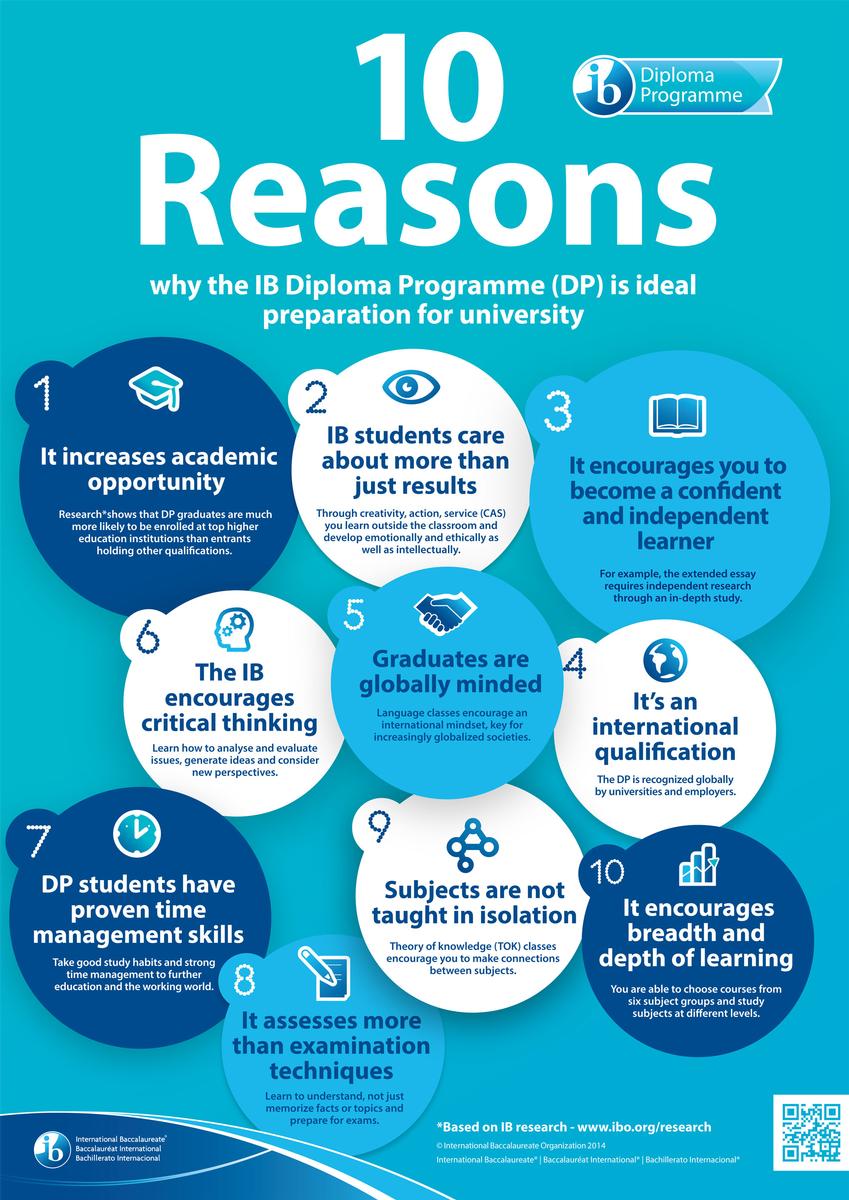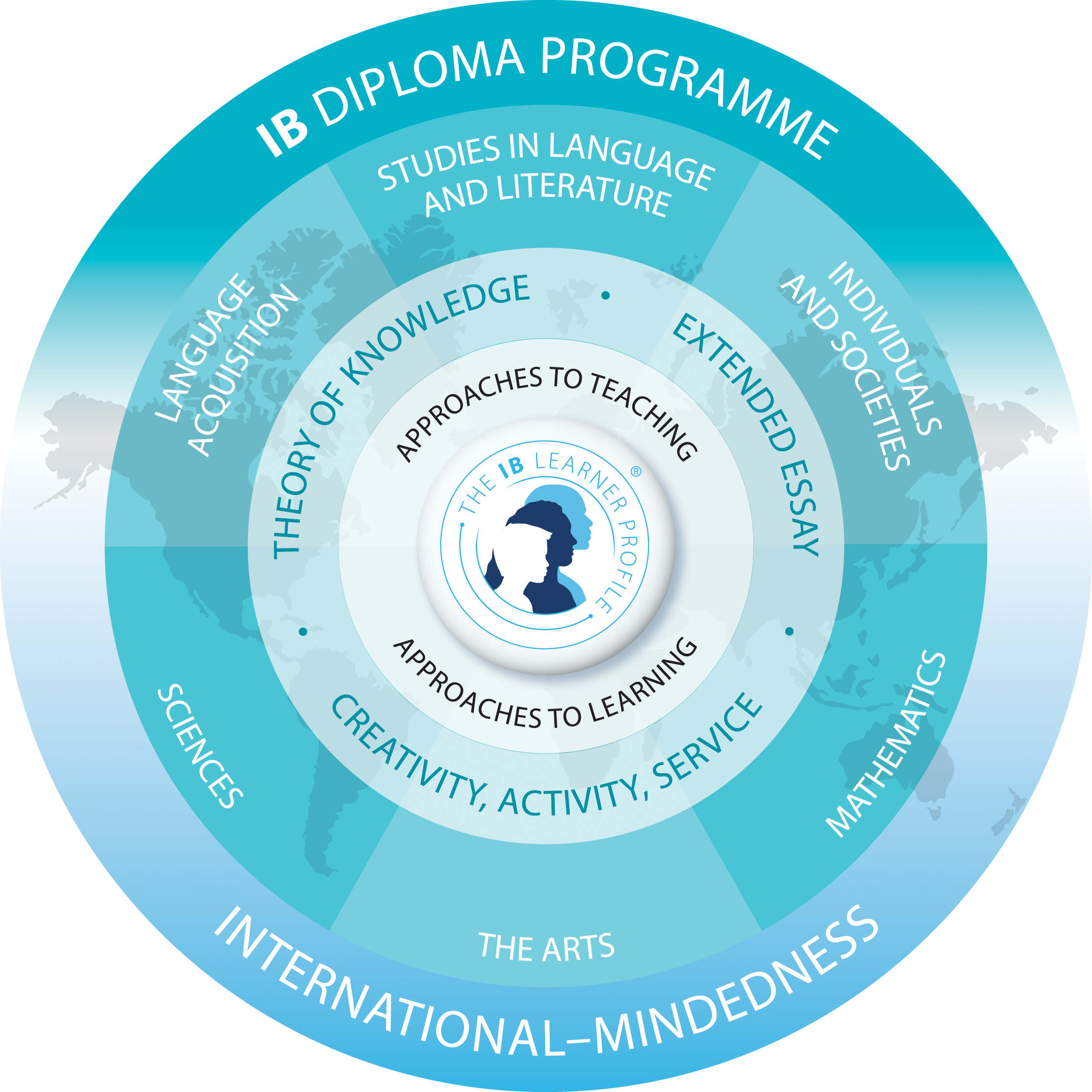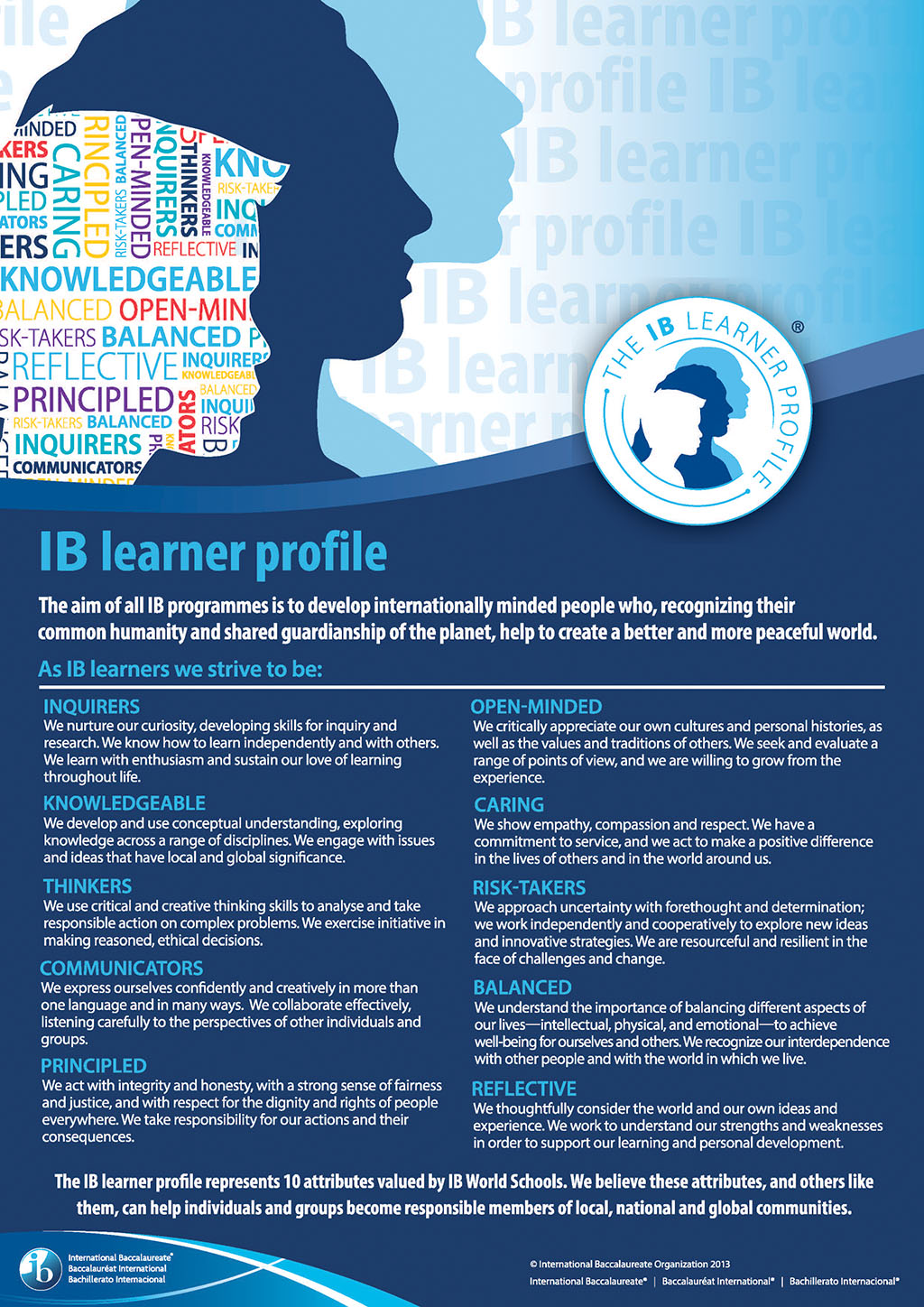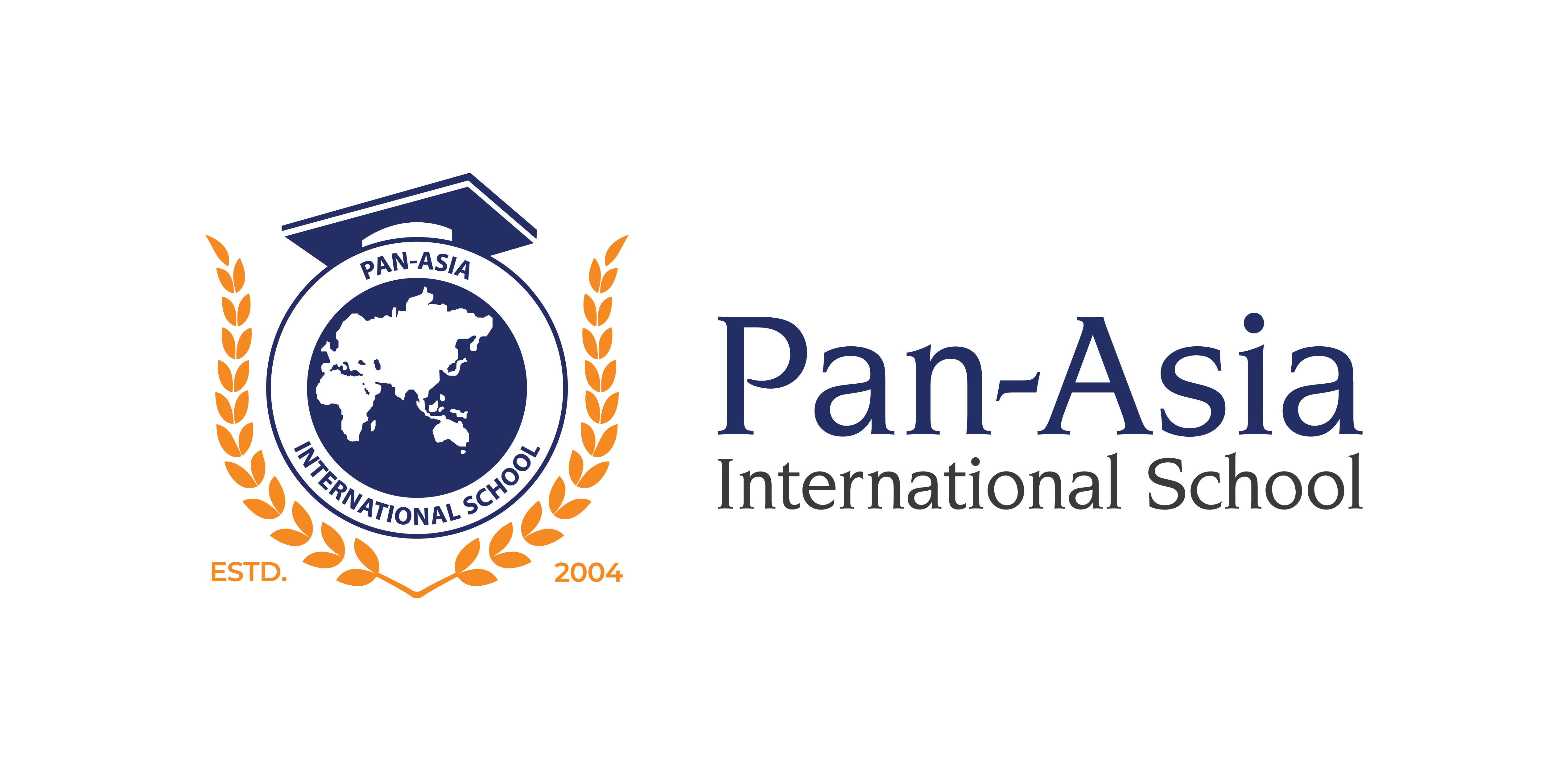



IB Diploma Program (DP)
The International Baccalaureate Diploma Programme (IB DP) was established in Geneva in 1968 to provide an international, and internationally recognized, university-entrance qualification for students studying outside of their home country. The IB’s goal is to provide students with the values and opportunities that will enable them to develop sound judgments make wise choices, and respect others in the global community. The IB Programme equips students with the skills and attitudes necessary for success in higher education and employment; it has the strengths of a traditional liberal arts curriculum, but with three important additional features, shown at the center of the hexagonal curriculum model (below). Today the IB DP has expanded so that more than half the students opting for it come from state or national systems rather than from international schools. As the IB DP has grown, so too has its reputation for excellence; the IB DP is now recognized in almost every country in the world as one of the pre-eminent pre-university qualifications.
The IB Diploma Programme is a two-year (Grades 11-12, or ages 16-19) international curriculum that allows students to fulfill the requirements for university entrance of their national or state education systems. Internationally mobile students are able to transfer into the IB Diploma Programme from other IB World schools, as well as from other school systems.
All Grade 11 and 12 courses at PAIS are IB courses. Students should start the process of choosing their personal program by consulting the list of subjects offered by PAIS. As well as considering their personal strengths in individual subjects, when making course selections students should also take into account their future education and career plans. Students should become familiar with the specific requirements of the universities in the countries to which they intend to apply as different universities in different countries have different entrance requirements. It is very important that you are aware that specific subjects or combinations of subjects could be required (or excluded) by the country or university of your choice. Information about universities around the world is available from PAIS’s college counselor. It is strongly recommended that students spend as much time as possible discussing their options with as many people as possible, including parents and teachers. Decisions made at this stage in a student’s education could affect the rest of their lives, so it is vital that choices are made only after full research and consultation. To be eligible for the IB Diploma, each student is required to follow six IB courses, with one subject taken from each group in the curriculum model:
Group 1: Language A (Language)
Group 2: Language acquisition (Language)
Group 3: Individuals and Societies
Group 4: Experimental Sciences
Group 5: Mathematics
Group 6: Arts and Electives
Further, all IB Diploma students must choose
-Three courses at higher level (HL) and three courses at standard level (SL) [recommended]
or
-Four courses at higher level (HL) and two courses at standard level (SL) In addition, all IB Diploma students must complete
-A course in the Theory of Knowledge (TOK)
-A 4,000-word Extended Essay in a subject of their choice
-A Creativity, Activity, & Service (CAS) programme
Theory of Knowledge (ToK)
Theory of Knowledge is a course centered on the question, “How do we know?” Students are taught to seek out knowledge through critical thinking and analysis of the Ways of Knowing: Perception, Emotion, Reason, Imagination, Faith, Intuition, Memory and Language. By the end of the course, students should be proficient in formulating arguments and analyzing knowledge claims. The central features of the Theory of Knowledge course are critical analysis questions called Knowledge Issues.
ToK Course Content
Students complete one hundred hours over the two-year course. The course is comprised of eight units centered on the following Areas of Knowledge and other main themes; each unit lasts approximately five weeks, and is taught by a teacher specialized in that area of study. These units are:
-Mathematics
-Natural Sciences
-Human Sciences
-History
-Art
-Ethics
-Religious Knowledge systems
-Indigenous Knowledge systems
Assessment
In the second year (Grade 12) of the course, students are officially assessed for their IB Diploma, based solely on two pieces of work: The ToK Essay on a prescribed title (1200-1600 words). This is supervised by a teacher in the school, and then graded externally by an IB examiner. The ToK Group Presentation (approximately 10 minutes per student). This is supervised and assessed by a teacher in the school. The final grade is then sent to the IB. The final ToK grade and the final Extended Essay grade are entered into the Diploma Points Matrix (see below) to award a possible maximum of 3 extra points to be added to a student’s Diploma score. Candidates not submitting satisfactory work in either area will fail the Diploma.
The Extended Essay
The Extended Essay is an in-depth study of a limited topic within a subject. Its purpose is to provide a student with an opportunity to engage in independent research at an introductory level. Emphasis is placed on the process of engaging in personal research, on the communication of ideas and information in a logical and coherent manner, and on the overall presentation of the Extended Essay in compliance with IB guidelines. Students are required to devote 40+ hours to the essay over the course of twelve months.
Subject Choice
In choosing a subject, an essential consideration should be the personal interest of the student. The subject should offer the opportunity for in depth research but should also be limited in scope. It should present the candidate with the opportunity to collect or generate information and/or data for analysis and evaluation. Extended Essays submitted in Language B (Arabic, Thai or Turkish) or Language and Literature A1 (Arabic, Thai or Turkish) must be written in that language. All other essays must be in English.
Organization of the Extended Essay
The Extended Essay is limited to 4,000 words and should include an abstract, an introduction, a development methodology, a conclusion, a bibliography, and any necessary appendices.
Assessment
The Extended Essay is externally examined. Marks are awarded against a set of published criteria (both general and subject-specific). The final Extended Essay grade and the final ToK grade are entered into the Diploma Points Matrix (see below) to award a possible maximum of 3 extra points to be added to a student’s Diploma score. Candidates not submitting satisfactory work in either area will fail the Diploma.
The CAS Programme
The CAS requirement takes seriously the importance of life outside the world of scholarship, providing a counterbalance to the academic self-absorption some students may feel within a school curriculum. The creative, physical and social development of human beings can be shaped by their own experience. Participation in CAS encourages students to share their energies and talents while developing awareness, concern and the ability to work cooperatively with others.
The emphasis of CAS is on experiential learning, and students are expected to be involved for the equivalent of at least 3-4 hours per week over the two years in a balanced range of different activities. A candidate must complete a minimum of three activities in each of the three areas of concentration Creativity, Activity and Service
“CAS IS NOT INTENDED TO BE FORCED THROUGH, ‘GOTTEN OUT OF THE WAY’, OR CAUGHT UP AT THE LAST MINUTE”
CREATIVITY: involves being actively involved creatively in an activity. This could include creative thinking in the design and carrying out of a service program for Student Council, Autism Society or organizing student involvement in the Red Cross Blood Donor Clinic or Run for Hope. This often involves DOING (participating in) dance, music, theatre, and/or art. You must be an active participant, not an observer. Watching plays, movies or music performances does not have the same experience level).
ACTIVITY: includes participation in expeditions, individual and team sports, and physical activities outside the normal curriculum. Activity could also be incorporated as part of a service project (labor required to work with Habitat for Humanity) or part of creative dance.
SERVICE: projects and activities are often the most transforming elements of the Diploma Program for the individual student. Service involves interaction, such as the building of links with individuals or groups in the community. Service activities should not only involve doing this for others but also doing things with others and developing a real commitment to them. The relationship should therefore show respect for the dignity and self-respect of others.
Assessments of CAS portfolios will take place in May of IB year 1 and in early April of IB year 2. Each logbook must be complete with an up-to-date activity tally sheet, a photograph and description of the student in each of the three areas of CAS and a reflection on their experience. If the element is incomplete, it will not be accepted for assessment. The choice of activities and their duration should show diversification and commitment. Students are expected to be involved for the equivalent of at least 3-4 hours per week over the two years in a balanced range of different activities. The following forms are to be used for CAS portfolio. CAS students are requested to fill in the forms which were highly suggested by other CAS Coordinators.
All the CAS students are asked to record their activities and later to be submitted to the CAS Coordinator for further checking and approvals. These forms are:
1. Activity Proposal Form : Students use this form the propose a CAS Activity
2. CAS Activity Evaluation Form : Students reflect and evaluate themselves
3. CAS Activity Supervisor Form : Supervisor reflect on the students
4. CAS Activity Log: Students record their activities and the key elements of CAS as Creativity, Activity and Service.
In order to understand the elements of CAS, please refer to the following suggestions of Creativity, Activity and Service
Creativity
Acting, Arts and Crafts, Caroling, Sculpture, Sewing, Art show, Learning a musical Instruments, Design classes, Participating in newspaper committee and school band
Activity
Soccer, badminton, dancing, water-skiing, horse riding, archery, basketball, golf, scuba diving, tennis, swimming, yoga, fitness and participation in school team
Service
Volunteering at hospitals and related services, Habitat for Humanity, Relay for Life, Homeless Shelters, Community Centers, Peer Tutoring, Teacher’s Aid, Yearbook, Charity events and related activities
